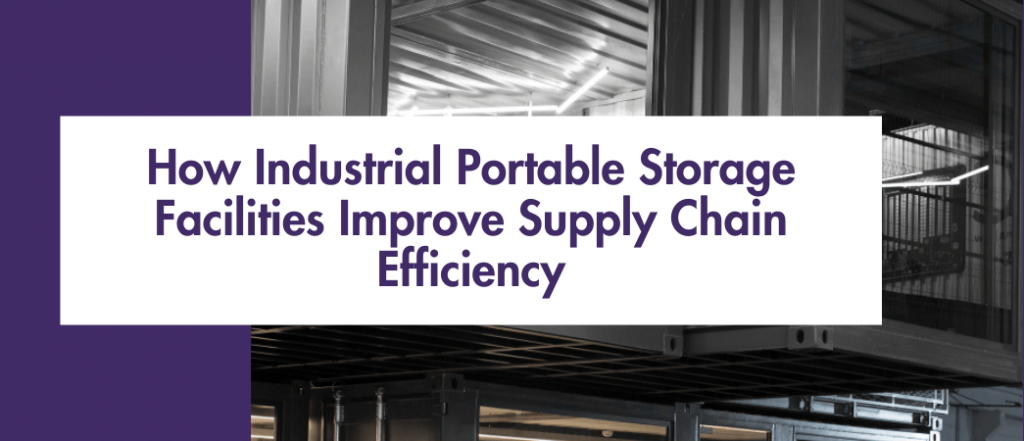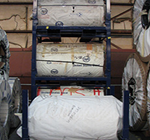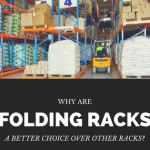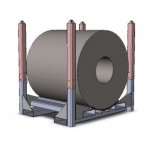How Industrial Portable Storage Facilities Improve Supply Chain Efficiency
For the modern, fast-moving world of logistics, businesses need to evolve further in streamlining their supply chains in order to maintain business competitiveness. Innovation within storage solutions is all about three drivers: efficiency, cost reduction, and flexibility. One of the ways to extend supply chain management includes using portable industrial storage facilities. These same facilities also aid companies in storing goods, raw materials, and equipment closer to where they are needed and help iron out bottlenecks to improve efficiency.
Let's understand how portable storage facilities improve supply chain efficiency, emphasizing the benefits of flexibility, accessibility, and cost-effectiveness. Using industrial portable storage along with storage units can help companies meet the increasing demands of modern supply chains and expand with ease into new markets.

Understanding the Role of Portable Storage in Supply Chains
Success for any effective supply chain is the uninterruptedly quick movement and storage of stock where it is required. Traditionally, companies have used permanent, centralized warehouses to manage their inventory. Industrial portable storage solutions offer a different alternative that can be flexible and adaptable to each situation. These are transportable, easily setup storage facilities that could be relocated as required and thus are ideal for companies needing temporary or mobile options for storage.
Unlike traditional warehouses, portable storage facilities offer businesses the following benefits:
- Scalability: Businesses can scale up or down based on seasonal demand, market condition, or project needs.
- Cost Savings: Portable storage tends to be cheaper than permanent warehousing, especially on grounds of short-term usage.
- Proximity to Operations: Placing storage units closer to manufacturing plants, distribution centers, or construction sites reduces the time and cost of transporting goods.
In fact, these benefits make portable storage facilities a critical asset in maintaining a lean and effective supply chain.
Key Benefits of Industrial Portable Storage Facilities
1. Flexibility in Storage Solutions
Probably the biggest advantage of industrial portable storage facilities is in their flexibility. Businesses no longer have to invest in large, permanent warehouses that may be underutilized during periods of low demand. Instead, companies can quickly deploy portable storage units wherever and whenever they are required. This flexibility ensures that businesses only pay for the storage space they need, avoiding unnecessary costs along with a general appreciation in overall efficiency.
Portable storage units also facilitate operations for those companies that operate on multiple sites. Other than having always to drive machinery and building materials from a faraway warehouse, a company may store the necessary supplies at the site to minimize delays and maximize productivity.
2. Increased Efficiency in Inventory Management
Inventory management is an indispensable part of any supply chain for the smooth flow of processes. Badly managed inventory results in stockouts, overstocking delays in production, and, ultimately, negative effects on a business’s bottom line. With closer storage facilities to the point of use, businesses can have better control over their inventory.
Industrial portable storage facilities enable a firm to store merchandise at strategic locations to cut down on lead times and ensure that materials are available when required. This, in turn, will enable enterprises to avoid such costly disruptions and simultaneously optimize the levels of inventory. Storage units can also be installed with the most advanced modern inventory management systems that enable the business to track stock levels, movements, and usage in real time.
3. Enhanced Security for Valuable Assets
Concerns regarding security have been one of the major issues that every business owner confronts when it comes to the storage of valuable assets, including raw materials, equipment, and finished goods. While traditional warehouses may provide advanced security features, portable storage facilities these days are designed with security in mind. In fact, several storage units come with high-quality locks, surveillance cameras, and even access control systems to ensure safety of stored items.
Having a safe, secure industrial portable option is a major advantage in sensitive or high-value product industries. Whether it is protecting multi-thousand-dollar machinery on a construction site or safeguarding raw materials near a manufacturing facility, modern storage facilities offer enhanced security features that provide businesses with peace of mind.
4. Cost-Effective Storage Solutions
Overhead in storage often eats into the profitability of many industries. From rents, utilities, and maintenance to staffing, permanent warehouses carry a long list of expenses. Portable storage units, on the other hand, are considerably inexpensive and ideal for any business experiencing fluctuating demands for storage space.
With seasonal industries, such as retail and agriculture industry, portable storage facilities offer a way to accommodate peak storage demands without the long-term financial commitment of permanent warehouse space. They are able to rent or buy storage units on a temporary basis, which means they can ensure that they pay for exactly what they need when they need it. This is an important level of financial flexibility for companies seeking ways to minimize operational overheads and maximize bottom-line profits.
5. Sustainability and Environmental Benefits
The concept of sustainability is fast gaining attention from businesses in all sectors. As companies seek ways to minimize their impact on the environment, industrial portable storage presents a sustainable solution. Many portable storage facilities require less energy to operate compared to their conventional warehouse counterparts, which in turn minimizes overall energy use. Besides this, the storage facilities can be used again, reused for other purposes, or even relocated to other sites. This will reduce the need for new construction and, therefore, new waste. Many portable storage facilities are also designed using eco-friendly materials, further adding to a company’s sustainability goals. Portable storage offers businesses a greener alternative without sacrificing operations efficiency.
The Role of Portable Storage in Disaster Recovery and Emergency Preparedness
In times of crisis, such as natural disasters or supply chain disruptions, having access to flexible and rapidly deployable storage facilities can make all the difference. Industrial portable storage units are an essential tool for disaster recovery and emergency preparedness, enabling businesses to maintain critical operations even in challenging circumstances.
For example, after a hurricane or flood, businesses may need temporary storage for equipment, raw materials, or products that are at risk of damage. Portable storage units can be quickly delivered to the affected area, providing a secure and weather-resistant space to store valuable items. This ability to respond quickly to unforeseen events can help businesses recover more rapidly and minimize losses.
Similarly, in the event of a supply chain disruption, industrial portable storage facilities can be used to store excess inventory or provide additional storage capacity until operations are back to normal. This flexibility is crucial for maintaining continuity and ensuring that businesses can adapt to changing conditions without suffering significant setbacks.
Enhancing the Global Supply Chain with Portable Storage
The global supply chain is more interconnected than ever before, with goods moving across continents to meet the needs of consumers and businesses. As globalization continues to drive demand for efficient logistics solutions, industrial portable storage facilities are playing an increasingly important role in enhancing the flow of goods across borders.
For multinational companies, portable storage units offer a way to establish storage hubs in strategic locations, closer to key markets or manufacturing centers. This reduces the time and cost associated with shipping goods from distant warehouses, enabling businesses to respond more quickly to customer demands.
Additionally, portable storage facilities can be used to bridge gaps in the supply chain, providing temporary storage solutions in areas where permanent warehouses may not be available or feasible. By incorporating portable storage into their logistics strategy, companies can improve supply chain visibility, reduce lead times, and increase overall efficiency.
The Future of Portable Storage in Supply Chain Management
As technology continues to advance, the role of portable storage facilities in supply chain management is expected to grow. Innovations in logistics, such as the use of automation and artificial intelligence, are driving greater efficiency and accuracy in inventory management. Portable storage units are increasingly being equipped with smart technologies that allow businesses to monitor conditions, track inventory, and even automate restocking processes.
For example, sensors placed inside storage units can track temperature, humidity, and other environmental factors, ensuring that sensitive goods are stored in optimal conditions. These smart technologies also allow businesses to receive real-time alerts if something goes wrong, enabling them to take action before a problem escalates.
In addition to technological advancements, the demand for more sustainable storage solutions is likely to drive further innovation in the design and materials used in industrial portable storage facilities. As businesses continue to prioritize sustainability, portable storage units that are energy-efficient, durable, and recyclable will become increasingly important.
Conclusion
In an era where supply chain efficiency is paramount, industrial portable storage facilities offer businesses a versatile and cost-effective solution to their storage needs. By utilizing portable storage units, companies can increase flexibility, improve inventory management, and reduce operational costs, all while enhancing security and sustainability. From providing temporary storage during peak demand periods to supporting disaster recovery efforts, portable storage facilities are an essential tool for modern businesses looking to optimize their supply chain. As the logistics landscape continues to evolve, industrial portable storage will play a critical role in helping businesses stay agile, responsive, and competitive.
About The Author










